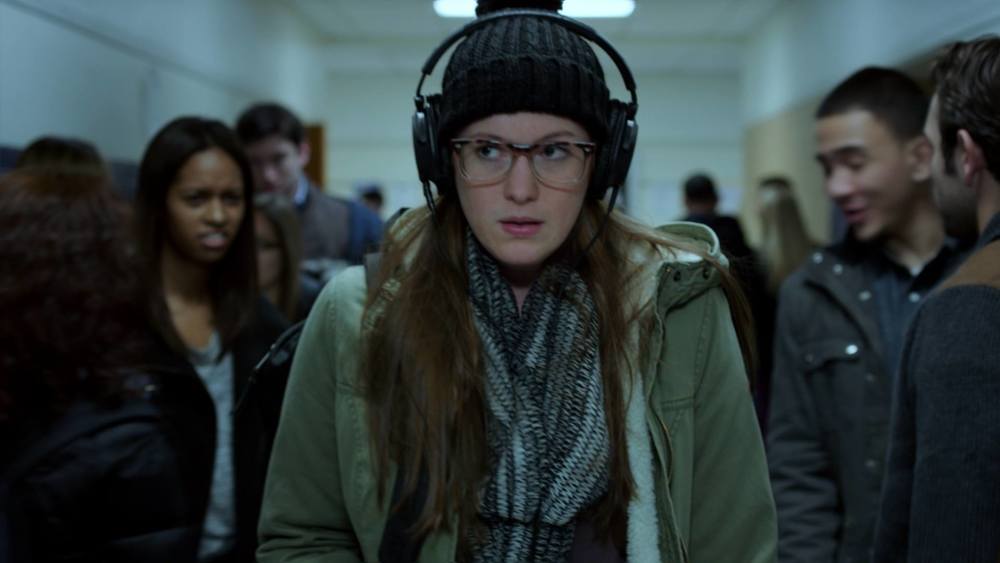
Los Angeles Film Festival hosted so many films directed by women, packing them all into one article would just be excessive. I already talked about Maria Goven’s tepid Play the Devil, but these next four films were real standouts. While too many independent films are plagued by a need to fit in, to conform, to act as a demo reel for some up-and-coming filmmakers just dying to get hired for a studio gig, these four purposefully and forcefully resist the marketplace, acting as pure vessels for the artists behind them. They find varying degrees of inspiration, but each is more than noteworthy.

I’m not very familiar with Amber Tamblyn, actress, but if she’s anything like Amber Tamblyn, filmmaker, I need to go consume her entire filmography right now please. Her debut feature, Paint it Black, somehow both assured and experimental, is rich with tonal variety and a depth of feeling in exploring and expressing grief and trauma. At 96 minutes, it’s way too short for the epic story it’s telling by any conventional measurement, but this limitation – brought on, one can surmise, by budget constraints – lends it kinship with similar melodramas from Hollywood’s golden age that had to pack a novel’s worth of story into less than 100 minutes. And melodrama this absolutely is, as unhinged and expressionistic as the traumatic story it’s telling. But with a little space for a masturbation gag.
Alia Shawkat stars as Josie, a punk-rock slacker who gets by on modeling for art classes. Her boyfriend, Michael (Rhys Wakefield), has been a little distant recently, verging on missing; soon she’ll learn he’s killed himself. His mother, a wealthy concert pianist (Janet McTeer), didn’t care for Josie, and blames him right away for his misery and everything else that went wrong in his life. Yet the two women can’t avoid one another. Nobody else cared for Michael as much as they did, nor depended on him so much for their emotional well-being. They each have very different ideas about who he was. Each thought they knew the real Michael. And so they scrap and fight and yell and steal and converse and share and bleed, all in a subliminal desire to be near someone who’s as torn up they are. Tamblyn and cinematographer Brian Rigney Hubbard paint their widescreen canvas in bold, bright colors (with a side trip here and there to black-and-white) that make for damn beautiful images that cook up what little tension the actresses aren’t unleashing onscreen.
Shawkat has proven herself one of the most game performers of her generation, creating a remarkably interesting filmography filled with fun, interesting projects, regardless of the size of the role she’s allowed in them. This is, to the best of my recollection, the first big starring role she’s had – I’ve gotten so used to mourning the lack of her in the films she’s in that when I saw her name on the cast list here, I assumed it was a supporting part – and is by far the most demanding work I’ve seen her attempt. She more than rises to the occasion, letting her loose screen persona adapt to the film’s many moods, keeping her reactions as surprising as the plot’s innumerable twists and turns. McTeer has the more dominating role, and it’s quite remarkable how unsettled the actress remains. Far from relying on the usual tics of the eccentric rich mother figure, she renders a character who’s sensual and desperate, a nightmare of a mother-in-law who is nonetheless quickly wins our sympathy. Paint it Black, along with My First Kiss and the People Involved, was the best film I saw during the festival, and I really hope it gets significant distribution quickly.

Amber Sealey’s No Light and No Land Anywhere is dealing with a different sort of grief, explored with an even greater sense of audacity and courage. Lexi (Gemma Brockis) has virtually abandoned her husband and home in England to search for the father who abandoned her and her mother decades prior. The search has brought her to one of Los Angeles’s many awful motels, where she mills about during the day and surreptitiously becomes a prostitute by night. She just always wanted to try it out, she says in voiceover. Her search does not live up to the dream she had of it, her father’s life considerably less romantic than she’d made it out to be, and the second family he formed in the States not exactly friendly towards Lexi’s presence. Sealey takes a mostly low-fi, handheld approach to the cinematography, often locking us directly into Lexi’s point of view, at times making it feel like the movie she’s making about herself. Which isn’t to say the film takes a purely positive view of Lexi; she’s just arrogant enough to present her flaws as virtues. Brockis, a stage actress making her film debut, commands the screen superbly well. She has a piercing gaze and anxious way of walking and moving that makes for an exciting, tense performance.

Erica Weiss and Caitlin Parrish’s The View From Tall is quite a bit uneasy itself, though less successfully so. Amanda Drinkall plays Justine, a 17-year-old whose favorite teacher has just relocated after it was discovered they were sleeping together. So she’s a bit angry. She starts seeing a counselor (Michael Patrick Thornton), but treats him so poorly he has to discontinue their professional relationship, though he makes himself available as a friend. The film takes neither an approving nor disapproving view of the inappropriate relationship that initiates the proceedings, suggesting that some are built from negative emotions and some can be quite beneficial if approached in a mature way. It hardly lets Justine off the hook, routinely portraying her as selfish and inconsiderate of the possibility that someone else might want to be her friend, especially her younger sister, who’s having a tough time of it at school with the reputation Justine has garnered. Their relationship is very well-built, acknowledging the way siblings sometimes feel like complete strangers who have been forced to live together, but can’t help but share a sort of bond over that shared captivity.
The performances are mostly quite good, but Weiss and Parrish never quite find a rhythm to them within their rigid visual style. The camera is almost always locked down, its placement carefully considered but unfortunately not very expressive, and the editing is not fluid enough to suggest every scene is taking place in the amount of time it takes. In other words, it all feels a little stitched together, the silences between exchanges a little too pronounced and actors in shot/reverse-shot patterns seeming to be performing in isolation. This is one of those tricky aspects to filmmaking that sometimes escapes first-time filmmakers (this is both of their feature debuts; Weiss previously helmed an episode of the short-form show Under Covers), a sense of pace that’s either there or it isn’t on the set, and which is tough to regain purely in the editing room. Some of this is on the performers, certainly, but it’s too similar across every scene, no matter the combination of actors, or their environment. A lot of the narrative and emotional instincts are there, though, and they take a lot of interesting chances with the narrative, so if this just ends up being a bit of an uneven step on their way to greater things, I would not be surprised.

However, the film that left me the most off-balance, the one that truly seemed capable of anything, and the one that was almost physically tough to watch, was Anaïs Volpé’s Heis (Chronicles). There aren’t a lot of foreign-language films at LAFF, and I was glad to have a chance to check out one, even if I suspect its very premise will turn off a good number. “One of the many millennial casualties of Europe’s stagnant economy…” begins the festival-provided synopsis, and I can already see many bolting for the exits. A bit of a documentary/narrative hybrid, Volpé deals head-on with “millennial issues”, and you can either accept these as legitimate grievances or not, I suppose. What I was most impressed by with the film, however, was how well Volpé molded her form to her content, more or less assaulting the audience with an unending stream of information and possibilities, echoing the way young people take in masses of facts, figures, and opportunities through the internet. If Volpé seems restless in the film, it’s only because she knows she could be doing so much at any given moment, and the idea of settling on one thing seems weirdly constrictive, however productive it may ultimately be. Even beyond its premise, this hyperdrive approach will likely not satisfy every audience member, and I confess myself to feeling exhausted not even halfway through the 93-minute film. But that exhaustion feels purposefully reflective of the stress Volpé is exploring. Whether that’s me making excuses for the art, I don’t know, but oh, how nice it is to experience a piece of cinematic art and not know how one is to receive it.



![Bergman Island (The Criterion Collection) [Blu-ray]](https://criterioncast.com/wp-content/uploads/2022/11/bergman-island-the-criterion-collection-blu-ray-400x496.jpg)
![This Is Not a Burial, It’s a Resurrection (The Criterion Collection) [Blu-ray]](https://criterioncast.com/wp-content/uploads/2022/11/this-is-not-a-burial-its-a-resurrection-the-criterion-collection-blu-ray-400x496.jpg)
![Lars von Trier's Europe Trilogy (The Criterion Collection) [The Element of Crime/Epidemic/Europa] [Blu-ray]](https://criterioncast.com/wp-content/uploads/2022/11/lars-von-triers-europe-trilogy-the-criterion-collection-the-element-of-400x496.jpg)
![Imitation of Life (The Criterion Collection) [Blu-ray]](https://criterioncast.com/wp-content/uploads/2022/11/imitation-of-life-the-criterion-collection-blu-ray-400x496.jpg)
![The Adventures of Baron Munchausen (The Criterion Collection) [4K UHD]](https://criterioncast.com/wp-content/uploads/2022/11/the-adventures-of-baron-munchausen-the-criterion-collection-4k-uhd-400x496.jpg)
![Cooley High [Criterion Collection] [Blu-ray] [1975]](https://criterioncast.com/wp-content/uploads/2022/11/cooley-high-criterion-collection-blu-ray-1975-400x496.jpg)